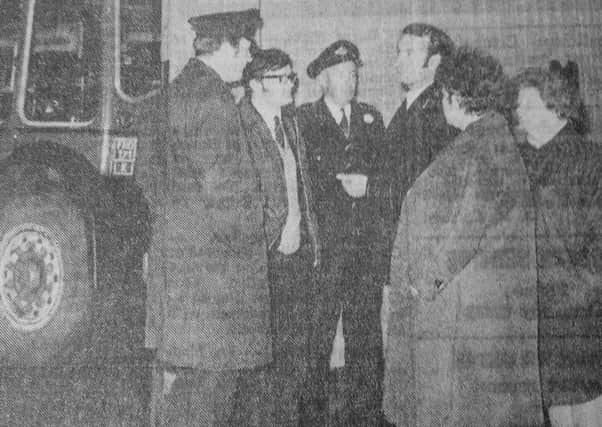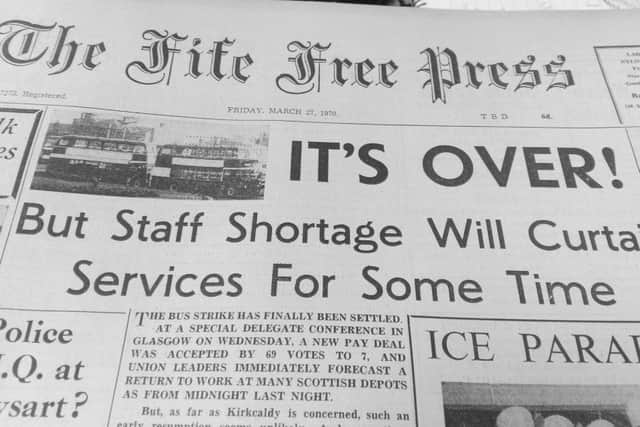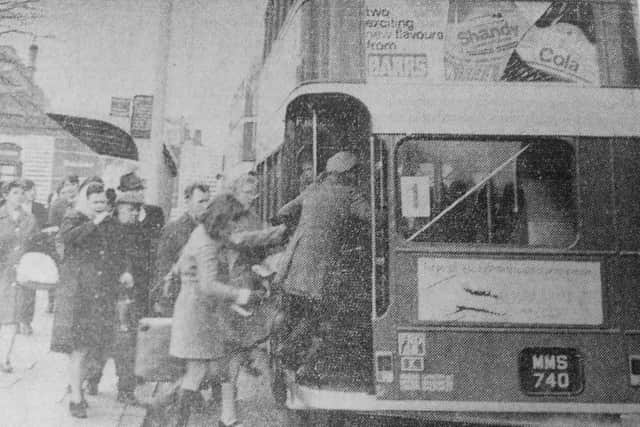Forgotten 1970 bus conductresses' strike which brought Kirkcaldy to a halt


One long-forgotten dispute actually brought Kirkcaldy grinding to a halt for the best part of three months at the start of 1970.
A new decade dawned with heavy snowfalls and a flu epidemic which wiped out schools and factories, and the misery was compounded by a prolonged strike involving bus drivers, conductors and conductresses.
Advertisement
Hide AdAdvertisement
Hide AdThey had already staged a three-week campaign in support of their campaign for a basic minimum wage of £18 per week – a rise of about £3 10/ – and equal pay for bus conductresses.


The issue had left the female clippies “extremely annoyed” and, while some depots worked as normal, the dispute took hold in Kirkcaldy and Dunfermline.
What started as a token one-day stoppage at W. Alexander & Sons (Fife) Ltd, based on Esplanade, took until April to resolve.
The industrial action was in support of colleagues in Cupar fighting management over the manning of one-man buses, but the big freeze didn’t help services as many buses found their radiators and brakes frozen.
Things then took off.


Advertisement
Hide AdAdvertisement
Hide AdStrike action by 200 conductresses paralysed local services and led to a virtual shut down of the Kirkcaldy depot.
Drivers reported for work as normal and offered to go out with another driver as a steward, but management rejected the move – and promptly paid them off.
In total 180 men found themselves heading to the Department of Employment and Productivity to sign on, where they were shocked to discover they did not automatically qualify for unemployment benefit because it was an unofficial strike.
Solution – the strike was made official!
That prompted the Scottish Bus Group to break its silence to say this wasn’t an equal pay issue, but it had to do with the maximum rate which should be reached.
Advertisement
Hide AdAdvertisement
Hide AdIt said that to increase the conductresses’ rate would mean that a driver with 30 years’ service would get only 7/9d more than a girl of 19 with one year’s service – a position it felt was undesirable.
Attitudes quickly hardened. The company made a bid to move idle buses out of Kirkcaldy to Edinburgh.
Six drivers were dispatched to drive the double deckers over the Forth, but news leaked out and shop stewards declared the vehicles had been “blacked” – and were going nowhere.
A second bid was made, this time with 28 drivers sent from other depots to Kirkcaldy. They got a few vehicles out before pickets rallied, staged an immediate garage-floor conference and blocked any further moves.
Advertisement
Hide AdAdvertisement
Hide AdKirkcaldy Town Council waded into the row, and urged both sides to get round the table.
Willie Ross, Secretary of State for Scotland, refused to intervene, and the strike gained momentum as the 200 conductresses were joined by 200 drivers and 30 cleaners.
While the dispute was peaceful, there were moments of tension and some angry scenes at the depot as buses from other areas functioned as normal.
A bus from the Kelty depot had its windscreen daubed with paint, and Lochgelly was pelted with stones.
Advertisement
Hide AdAdvertisement
Hide AdThat lack of unity was a key factor in some hard hitting speeches at a packed mass meeting at the Rio Cinema
“If you think Eastern Scottish is going to be placed in a similar position to you then you are up a gum tree” warned James McGillvray, shop steward at Edinburgh – but no buses were now coming into the strike area and pickets were sent to other depots.
In February, the strikers sealed off the depot completely as the County District Garagement Committee called for a complete one-day stoppage across Fife.
The first steps towards a deal came with a three-hour meeting in London with TGWU officials, but it wasn’t until March that the strikers agreed a new pay deal – and even then it took the best part of one month to get everything back to normal.
Advertisement
Hide AdAdvertisement
Hide AdDrivers got £17 10/- for a 40-hour week, and the new rate for conductresses was £17 4/-.
“Thank goodness the strike has ended,” said Provost H.A. Nicholson. “I would hope this is the end of our troubles” ... just as businesman Fred Stahly led a petition seeking a rates reduction to compensate for lost business which, he estimated was down 25-30 per cent.
And when the busesdid run again, no-one noticed.
Reported the Press: “With hardly so much as a flicker of interest from a public grown accustomed over the past 11 weeks to either walking or travelling by car, Kirkcaldy’s buses came back on the road.”
Services were cut and there was the threat of a fares rise too, and many bus stops remained empty
“The public had to be educated to walk when the dispute started – now it seems they have to be educated to travelling by bus again!” noted the Press.
